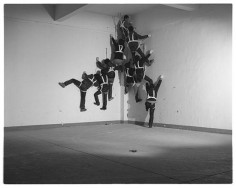GAO SHIQIANG
Total Eclipse

source: ocula
Gao Shiqiang was born in Shangong province, and graduated from the China Academy of Art in Hangzhou in 2003. Since the mid-1990’s he has been at the forefront of video art and film making in China. He has increasingly turned to film in order to explore subjects ranging from ancient folklore (as in Butterfly Lovers) and recollections of the Communist era (Red) to more anthropological concerns, as in Faint with Oxygen.
Gao first came to international attention with his participation in the 2003 Guangzhou Triennial. His work was included in the 2006 Shanghai Biennial and in the satellite project, A Yellow Box in Qinpu, curated by Gao Shiming and Johnson Chang. In addition to film-making and teaching, Gao has curated a number of projects dedicated to new media, including the 2005 Blink in Shanghai (a festival of 2-second video). He is currently professor of Experimental Art at the China Academy of Art in Hangzhou.
.
.
.
.
.
.
.
source: shanghaibiennaleorg
Born in 1971, lives and works in Hangzhou
Artist statement: “On 22 July 2009, what was apparently a once-in-a-century full solar eclipse occurred in China. At the same time, the financial crisis that erupted in New York also began to affect the lives of Chinese people.
“This crisis for us is not only an economic calamity but an opportunity – the linkages in everyday order started to shake loose; ‘normal logic’, once solid like metal plates, started to crack. Through the wrinkly surface of life which struggles to make ends meet, we seem to be able to glean at what lies at the bottom of our hearts – those desires, fantasies, remembrances and illusions that have long been suppressed by ‘everyday morality’. This allows us to re-evaluate our lives with a different method and from a different perspective.
“When the solar eclipse occurred, things seemed to have started changing. At that instant, when heaven and earth turned dark and day traded places with night, the soul was also loosened from its restraints. Clearly, the ‘total solar eclipse’ was not only a one-time description but a provocation – prying away at the cracks and shaking up ‘ordinary days’, unchanging and stuck in a rut, brushing away the flavorless, prosaic, commonplace day-today, and unveiling the surreal nature of life.
“This film was shot inside a factory, abandoned soon after its completion because of the repercussions of the financial crisis. There is a major thread throughout: representative time gradually morphs into abstract time. With the extension of the timeline, several seemingly ordinary scenes gradually enter into a fantastical scene of space-like weightlessness, with every scene ending with an intense flash of blinding white light that blows everything out.
“I hope to refine, like the words finely hewn in poetry, every shot, every image, to render them full of tenor, air and feeling. By using cameras with higher frame rates, a sense of time frozen is created; with the studio set-up, a fantastic spatial imagery is forged; through the poetic logic of the camera, the spiritual portrait of contemporary China is depicted.” – Gao Shiqiang

